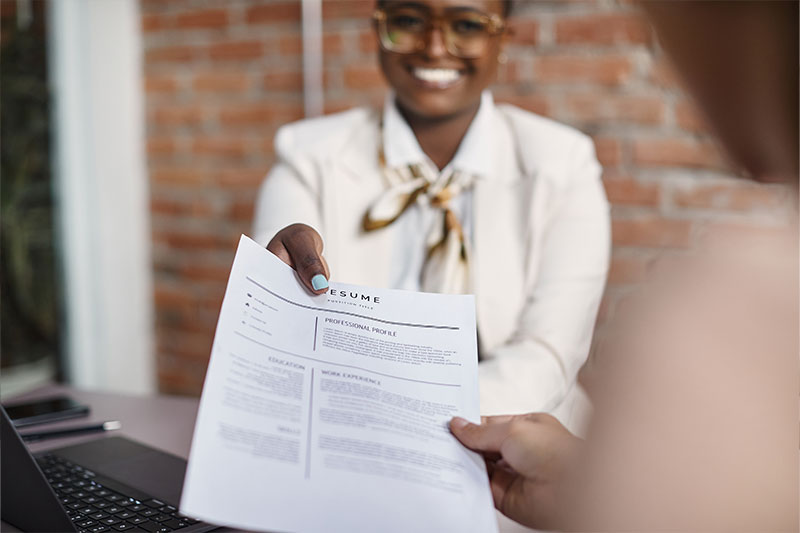The thrill of a job interview is always mixed with a dose of anxiety—been there, felt that. We know those nerves can kick in but fear not! We’ve gathered expert job interview tips from seasoned recruiters to help you ride that interview straight to a job offer.
Introducing one of HGS OSS’ finest recruiters: Jally Ballega from the Talent Acquisition team! She’s here to give us the low-down from common job interview questions to positive post-interview signs! So, listen up and let’s hear job interview tips straight from the pros!
Before the Interview: Preparing Your Resume
Think of your resume, CV, or even your LinkedIn profile as a pre-interview pitch! Your resume is the best chance to pique the interest of potential employers before you even meet them.


Some would make their resume one-and-done, with no further revisions until new experiences can be added. But as Jally advises, “…it’s important to tailor it to the specific job you’re applying for.” So, be sure to think about what your potential employer may want to see based on the job description that you’re aiming for. Keep it simple and focused. Highlight the skills and experiences that directly relate to the role.
Common Resume Misconceptions
The interview highlighted 3 common resume misconceptions:
- Job Duties are Less Important Than You’d Think. It’s better to highlight measurable results and achievements!
- Hobbies also aren’t that important unless…they relate to the job! While it’s nice to include your interests, only choose the ones relevant to the position or company.
- Include a customized introduction summary! “I think the customized summary or objective at the top of the resume [is often overlooked].” It’s a resume detail that can really grab attention!
By avoiding these common resume pitfalls, you can craft a more impactful resume that will help you land your dream job. Start refining your resume today, and you’ll land that interview in no time!
How to Prepare for a Job Interview
Preparation is usually the cornerstone of a successful job interview, “Whether it’s in-person or online, preparation is key.” There are different ways to prepare for an interview:
- Researching Your Potential Employer
- Practicing Common Interview Questions
- Perform Mock Interviews
Let’s dive into each of them, shall we?
How to Research Potential Employers
Conducting research on your potential employer should give you that boost going into the job interview and show initiative. It demonstrates that you are genuinely interested in both the role and the organization.


Familiarize yourself with the company overview. Understand the organization’s mission and values by going through their website. You can also get a feel for their company culture by scrolling through their social media pages.
A great way to impress recruiters is to highlight recent projects from the organization that you saw online!
What are Common Job Interview Questions?
Recruiters tend to ask a standard set of questions that you can anticipate. A great job interview tip is to familiarize yourself with them to be well-prepared:
- “Why did you leave your previous company?”
Your interviewer will likely ask about your reasons for leaving your current job. Instead of dwelling on negative aspects, frame your answer positively. For example, instead of saying ‘I left because there was no growth,’ you could say ‘I’m seeking new opportunities to challenge myself and advance my career.’
- “Tell me something about yourself.”
As simple as this one may seem, it’s a potential pitfall for a lot of interviewees since a lot fail to prepare for it. Alison Green, columnist from The Cut, advises that you should always keep it professional, not personal. A strong answer, according to Green, is concise yet shows how you started in your career, noting achievements, and ending with what you want to do next.
- “Why do you want to work here?”
Flattery can be a good thing here, but not too much. Talk about your interest in the organization to showcase that you have some investment in its success. Try to structure it broadly first, talk about the industry, and then focus on why this company caught your interest.
- “Why did you apply for this position?”
This is your chance to show genuine interest in the role, whether it be to build on your current skillsets or to explore something new. It’s also a great opportunity to show your plans for the future, and what you can bring to the table.
These are some of the questions you can expect, but not all of them, of course. “[You should] practice answering common interview questions but also be ready for role-specific questions.”
How to Conduct a Mock Interview
A mock interview is a great practice tool that simulates a real job interview. Think of it like a rehearsal before a big show. Here’s why they help:
- Practice makes perfect. You can practice answering common interview questions and tailor your responses to specific roles you want.
- Gain valuable feedback. You’ll receive valuable feedback from your mock interviewer on your tone, voice, and overall delivery.
- Identify Strengths and Weaknesses. Mock interviews let you pinpoint areas where you excel and where you can improve your job interview skills.
After asking a friend, family member, or even a career mentor to be your mock interviewer, you can start! “Set up a quiet space, have [them] ask you both technical and behavior questions, and practice answering them out loud.” After all, you probably already have the answer in your head: it’s just hard to verbalize it.


Don’t be afraid to make mistakes; that’s why mock interviews exist. It’s not meant to be perfect, just a space to learn and grow.
Online Vs. In-Person Interviews
A big thing to consider nowadays is whether your interview is set to be conducted in-person or online.
The biggest difference, according to Jally, is body language. In online interviews, it’s hard to rely on physical aspects of communication, “so it’s crucial to look directly at the camera to mimic eye contact.” It’s also important to still be presentable despite being at home. Do create a quiet, tidy, and professional environment, “and [still] dress as if you’re attending in person.” If space is a problem, you can always use a background filter!


While in-person interviews require attention to body language, eye contact, and a confident handshake! Always be cautious about your non-verbal cues as sometimes it’s the subtle things that can go wrong. Overall, do your best to arrive early, and try to dress appropriately.
What is considered “appropriate” job interview attire may vary depending on the industry, “but you can never go wrong with business casual.” However, if you’re unsure, it’s better to be slightly overdressed than underdressed!
What the Recruiter Wants to Know
One of the smart job interview tips you can study up on is to understand what the recruiter wants to know. It’ll help you anticipate questions outside of the common ones, but it’ll make the interview go more smoothly and focused.
The interview is mainly to look at two things: you as a professional, and your collaboration skills as a teammate. So, here’s Jally’s input on what the recruiter wants to know:
You as a Team Member. “We want to understand how a candidate works within a team, handles conflicts, and contributes to shared goals.” It’s best to highlight projects you’ve worked on and some struggles that you’ve encountered along the way as a team. For fresh graduates, talk about your experience in school from internships to volunteer work that shows your effective collaborative skills. Either way, this lets recruiters know how you communicate, your adaptability, and ability to work as a team.
You as a Professional. You’ve probably heard of the “Strengths and Weaknesses” part of any interview, but why do recruiters ask it? “[It’s] designed to assess self-awareness and honesty.” No one’s perfect, and no one is fully flawed. Knowing your strengths shows confidence in your abilities, and acknowledging weaknesses demonstrates a growth mindset.
But how do you answer the “Strengths and Weaknesses” portion of the job interview? Focusing on your strengths to that relevant, firstly. Show what you can bring. “For weaknesses,” Jally advises, “choose something you’re actively working on and improving.” The key is to show awareness of where you can grow, and that you are motivated to take steps towards improvement.
Positive Post-Job Interview Signs
Sometimes it’s hard to tell when a job interview goes well, but here are Jallys tips on 3 positive post-interview signs:
- If the interviewer discusses the next steps. It’s a great sign if the interviewer talks about what’s going to happen next or even introduces you to other team members.
- If they ask you questions. It’s always a good sign if the interviewer starts to ask questions, meaning they are interested in exploring your skills further.
- They provide insights into the team or company culture. If they start talking about the team dynamics, work environment, or how your skills and personality might be a good fit, it’s a strong indication that they’re considering you for the position.
Of course, these may not be a guaranteed yes, these are just a few good signs or at least a way to know that you’re doing something right.
Testing out the Job Interview Tips
Before we leave, we’d love to give a quick shout out to our lovely recruiter, Jally, for giving us these job interview tips! Thank you so much Jally for answering our hard-hitting questions.
So, what are you waiting for? Take these tips out on the open road and start applying for your new career! You can check out the open roles we have at our HGS OSS Careers site today. Hey, you might even be interviewed by Jally herself!

